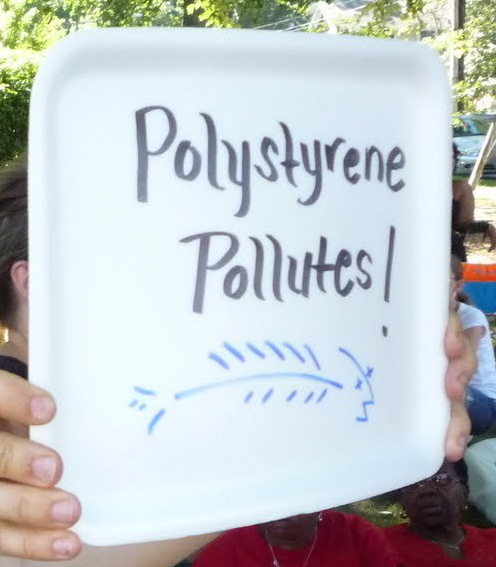- Implement earlier than January 1, 2018: Consider making this part of the bill effective within one year of passage. This is typical of the dozens of laws passed by other jurisdictions including Santa Monica County (effective 1 year after passage), San Francisco (effective 7 months after passage), and Seattle (effective 6 months after passage).
- Allow business exemption for undue hardship: In order to gain more business sector support, consider allowing a waiver for a period of up to one year for undue hardship. Many cities have done this including San Francisco and West Hollywood (CA).
- Consider excluding meat trays: San Francisco’s ordinance specifically excludes raw, butchered meats, fish and/or poultry sold from a butcher case or similar retail appliance. Santa Monica’s exclusion extends to raw eggs. (Note however that Seattle is an example of a community that has successfully banned polystyrene meat trays.)
- Clarify that churches, social service organizations, childcare centers, nursing facilities, hospitals, detention facilities, and schools are not exempt: These foodservice sites often serve the most vulnerable populations, who can least handle associated health risks. Such a clarification aligns well with the intent of DC’s Healthy Schools Act. West Hollywood, CA’s law is clear on this by including non-profit food providers, who are prohibited along with other food establishments from providing prepared food to their customers in any food packaging that utilizes polystyrene. San Francisco’s Food Service Waste Reduction Ordinance covers “City Facility Food Providers” that provide, but not sell, prepared food in City facilities, including hospitals and jails.
- Do not limit bill to expanded polystyrene only (just styrofoam): Cups, take-out containers, and plastic cutlery are frequently made from a clear, white or colored non-foam rigid type of polystyrene. These are examples of rigid polystyrene. West Hollywood (CA), The City of South San Francisco (CA), the City of Hermosa Beach (CA), and Brookline (MA) are among those cities that have laws that go beyond expanded polystyrene to cover the rigid form as well. Because of the health concerns of eating off a product derived from a cancer-causing material, all forms of polystyrene for foodservice should be banned. Consider that styrene is directly soluble in alcohol and that the popular blue, red, and yellow polystyrene cups (made by Solo Cup) are the standard choice for serving beer at parties.
- Encourage use of reusable, recyclable, or compostable foodservice ware: The most sustainable cities are moving away from single-use disposable products. Seattle passed its foodservice packaging restrictions in two phases. Phase I restricted use of polystyrene. Phase 2, implemented 18 months later, required foodservice packaging to be reusable, recyclable, or compostable. In Seattle, virtually all foodservice establishments now use compostable ware; even food trucks have bins to collect compostables. Dick Lily with the City of Seattle credits the wide availability of compostable service ware, which went from 70 products to 700 in 3 years, and now has reached more than 3,700, for enabling his City’s packaging requirements to work. [See the Biodegradable Product Institute’s compostable foodservice ware online catalog.]
- Consider adding enforcement provisions directly to the bill: Most of the local laws enacted do so.
- Make the Food Safety and Hygiene Inspection Services Division of the DC Department of Health responsible for enforcement: This division already employs 17 sanitarians tasked with inspecting the city’s 5,100 food establishments. Compliance with the polystyrene ban could easily be added to their “Inspection Checklist for Food Establishments.” San Francisco avoids additional inspection costs by relying on its existing food safety inspectors.
- Prohibit sale of expanded and non-expanded polystyrene foodservice products: Allowing grocery stores and packaging vendors to sell polystyrene foodservice products for home or community use is a loophole that will weaken the effectiveness of the law. Sunnyvale, CA’s law (which passed November 2013), bans all commercial sales of expanded polystyrene food containers beginning April 2015, a year later than its ban applicable to food service establishments.
- Ensure that the law covers special events and caterers: Palo Alto, CA’s law covers City-sponsored and City-permitted events, and clarifies that caterers are considered food vendors.




